Tired of city life, Neil and Momo moved from Mumbai to a rural area in India. On abandoned land, they began again — growing food, building a zero-waste farm, and learning to live simply. Today, their journey inspires others to slow down, reconnect with nature, and find joy in doing things differently.
Neil’s path to this life began with a rigorous education in engineering, followed by business management. “I was chasing success, but somehow I felt disconnected from people, purpose, and the world around me.”
On the other hand, Momo’s upbringing was woven with the colorful threads of art and culture. From childhood, she indulged in the world of theater and film, pouring her heart into performances that captivated audiences and brought stories to life. But beneath the applause and the bright lights, she felt a yearning that went beyond the stage. “It was not that I wanted to leave my passion behind,” she reflects, “but I needed to find balance, a life where creativity could flow naturally, alongside peace and simplicity.”
 Neil and Momo’s meeting in 2015, through a matrimonial website, brought these shared longings into focus. So, they made the daring decision to walk away from the noise and pace of city life and live in nature’s lap.
Neil and Momo’s meeting in 2015, through a matrimonial website, brought these shared longings into focus. So, they made the daring decision to walk away from the noise and pace of city life and live in nature’s lap.
Neil enrolled in formal permaculture training, immersing himself in the principles of regenerative agriculture, learning how to design systems that restore soil health, conserve water, and support biodiversity. Alongside this, the couple chose to live and work on farms run by friends and mentors, spending time in different rural settings to observe, ask questions, and understand the realities of land-based living.
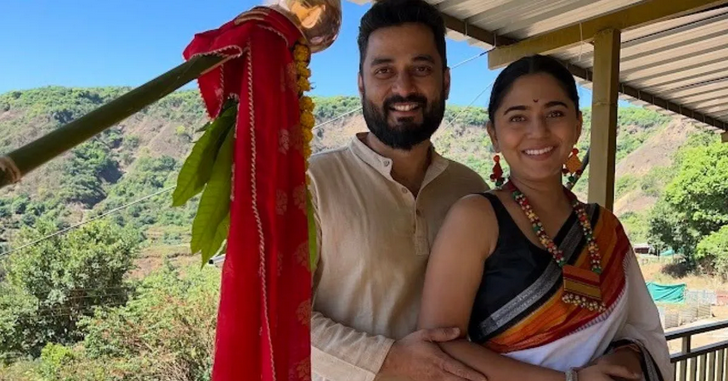 In 2020, they finally took the leap and sold everything they had in Mumbai and purchased a piece of land in a small village tucked in monsoon-fed hills. But the land they chose was not a picture-perfect plot; it was barren in places, stripped of nutrients, and in need of healing. That is exactly why they chose it.
In 2020, they finally took the leap and sold everything they had in Mumbai and purchased a piece of land in a small village tucked in monsoon-fed hills. But the land they chose was not a picture-perfect plot; it was barren in places, stripped of nutrients, and in need of healing. That is exactly why they chose it.
“We spent the whole of 2021 just observing,” the couple explains. “In the first year of shifting to the land, you are not supposed to touch anything; you just watch, listen, and try to understand what the land needs.”
 In 2022, they built a small one-room studio on the farm and began the work of establishing their food forest. “We wanted to move in quickly, so the house was designed to be simple but very scientific,” explains Neil. “Its alignment is east-west, which allows us to make the most of the natural wind flow to keep it cool.”
In 2022, they built a small one-room studio on the farm and began the work of establishing their food forest. “We wanted to move in quickly, so the house was designed to be simple but very scientific,” explains Neil. “Its alignment is east-west, which allows us to make the most of the natural wind flow to keep it cool.”
The materials they chose were rooted in the local landscape. “There is no plaster on the outside; the walls are made of laterite, a native stone. Inside, we avoided cement completely and used lime instead. We built the entire house ourselves, just the two of us, with our own hands,” says Momo.
Their home is entirely solar-powered. “We are net zero in terms of electricity,” they explain. “It is a tiny house, so it does not take up too much space, and everything was designed using passive solar principles,” she adds.
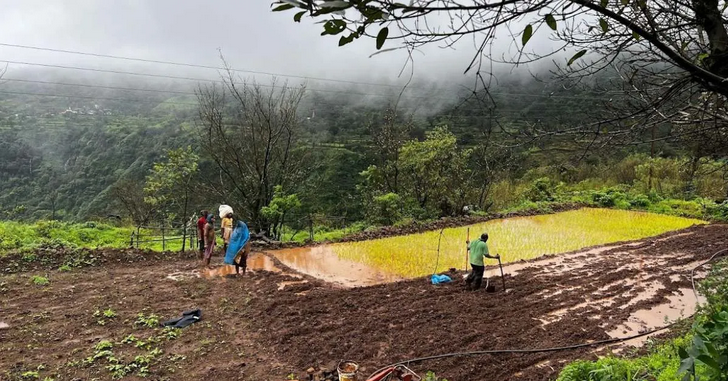 Rainwater harvesting plays a crucial role. “All the runoff from the roof is captured and stored in tanks, then directed to irrigate the food forest,” her husband says. Even wastewater is carefully managed. “Our greywater, from the bath and kitchen sink, passes through reed beds, where it is naturally filtered, and then it goes to water our banana plants,” he explains. Nothing goes to waste. “We compost all our kitchen scraps and return them to the farm. Everything stays within the system,” they say.
Rainwater harvesting plays a crucial role. “All the runoff from the roof is captured and stored in tanks, then directed to irrigate the food forest,” her husband says. Even wastewater is carefully managed. “Our greywater, from the bath and kitchen sink, passes through reed beds, where it is naturally filtered, and then it goes to water our banana plants,” he explains. Nothing goes to waste. “We compost all our kitchen scraps and return them to the farm. Everything stays within the system,” they say.
They grow what they eat, collect their own seeds, and craft with their hands. Neil and Momo’s farm is a carefully designed, regenerative ecosystem where every element, from the soil to the plants to the wildlife, is part of this symbiotic relationship.
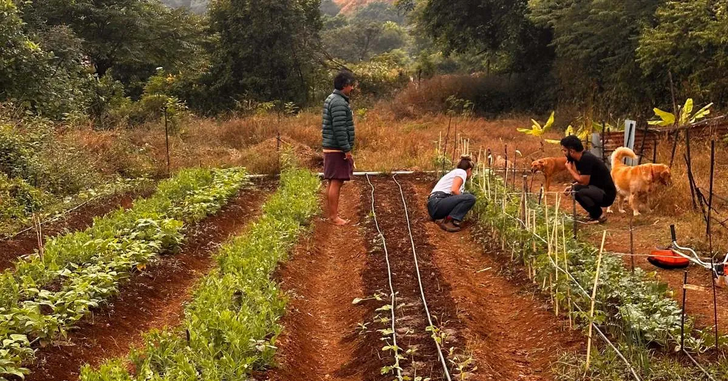 Over five years, they changed three acres of degraded land into a lush farm. Through composting, cover cropping, mulching, and planting a diversity of crops and trees, they added over 30 tonnes of organic matter to the soil. “Watching the soil come back to life has been the most rewarding part,” Momo says. “The earth is resilient when you treat it with respect.”
Over five years, they changed three acres of degraded land into a lush farm. Through composting, cover cropping, mulching, and planting a diversity of crops and trees, they added over 30 tonnes of organic matter to the soil. “Watching the soil come back to life has been the most rewarding part,” Momo says. “The earth is resilient when you treat it with respect.”
Since 2023, they have been hosting immersive three-day “Introduction to Permaculture” workshops, blending theory with hands-on learning to offer a rich and practical experience to interested visitors. Over 150 participants have taken part in these workshops until now.
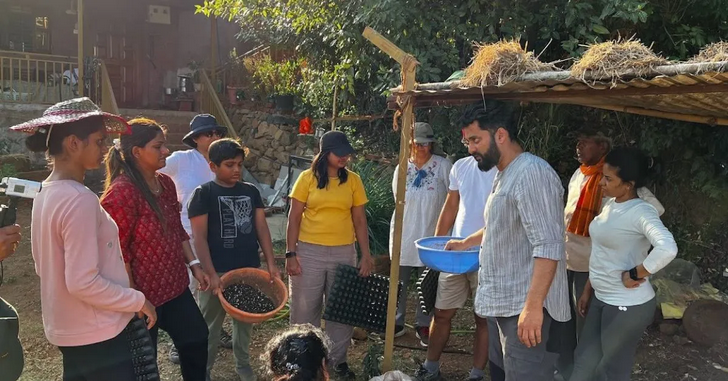 Each workshop begins with forest walks to introduce participants to the native ecosystem, followed by classroom sessions on permaculture ethics and design principles. Participants learn to observe natural patterns, map contours, test soil health, and design water harvesting systems. Practical activities include seed starting, compost making, and building soil fertility. “We then gather for an open discussion, where we reflect on each person’s lifestyle and conduct a simple life audit,” explains Neil. The goal is to help everyone identify small and practical steps they can take to begin managing and reducing their waste immediately.
Each workshop begins with forest walks to introduce participants to the native ecosystem, followed by classroom sessions on permaculture ethics and design principles. Participants learn to observe natural patterns, map contours, test soil health, and design water harvesting systems. Practical activities include seed starting, compost making, and building soil fertility. “We then gather for an open discussion, where we reflect on each person’s lifestyle and conduct a simple life audit,” explains Neil. The goal is to help everyone identify small and practical steps they can take to begin managing and reducing their waste immediately.
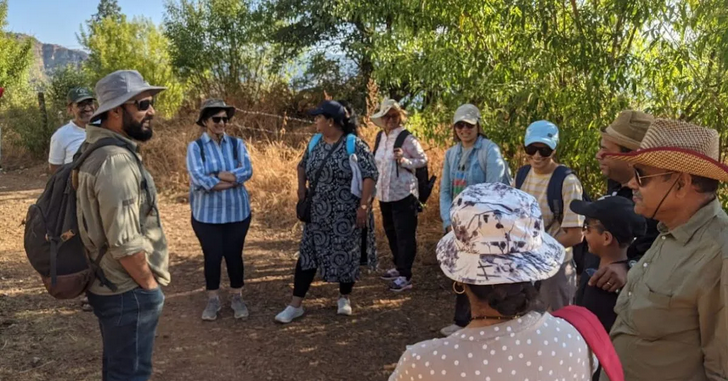 “We believe in empowering others to become caretakers of their land, whether that is a backyard garden or a larger farm,” the husband shares. “These workshops are seeds that grow beyond our farm, spreading regenerative practices across communities.”
“We believe in empowering others to become caretakers of their land, whether that is a backyard garden or a larger farm,” the husband shares. “These workshops are seeds that grow beyond our farm, spreading regenerative practices across communities.”
 “When the land sings back to you, when the frogs croak at night and the birds greet you in the morning, that is when you know the work is real,” Momo reflects.
“When the land sings back to you, when the frogs croak at night and the birds greet you in the morning, that is when you know the work is real,” Momo reflects.
You can read the original article at thebetterindia.com
